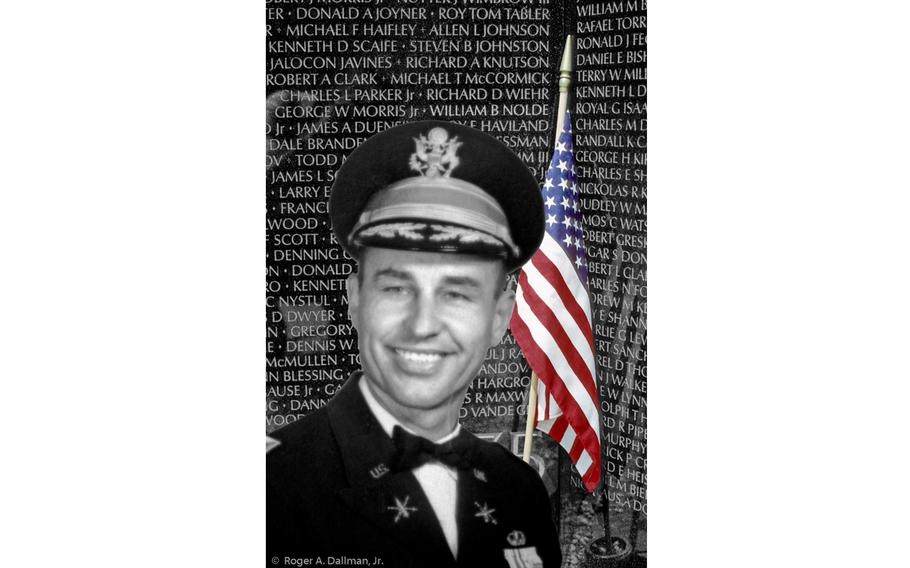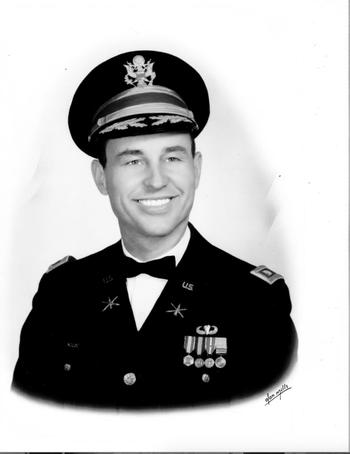
Army Col. Bill Nolde was killed by North Vietnamese artillery or rocket fire just hours after the peace treaty marking a formal end to the Vietnam War was signed on Jan. 27, 1973. (Composite by Roger A. Dallman Jr.)
On April 23, 1971, testifying before Congress on behalf of the Vietnam Veterans Against the War, 28-year-old former U.S. Navy Lt. John Kerry decried the lies and “criminal hypocrisy” of American leaders and policymakers who attempted to justify the war and the many casualties resulting from our involvement. Debunking the “domino theory” — that the loss of Vietnam would cause Communism to spread to other countries — Kerry said, “there is nothing in South Vietnam which could happen that realistically threatens the United States of America.” He then memorably added, “How do you ask a man to be the last man to die for a mistake?”
The peace treaty marking a formal end to the Vietnam War was signed on Jan. 27, 1973, 50 years ago. Thus, it seems an appropriate time to pay tribute to that Last Man — U.S. Army Col. William Benedict Nolde.
Born on Aug. 8, 1929, in the town of Menominee on Michigan’s Upper Peninsula, Bill Nolde grew up on a small farm, the sixth of eight children. After graduating from high school in 1947, he earned a two-year teaching certificate at Central Michigan University, which he attended on scholarship. In 1951, Bill married Joyce Fusee, a fellow schoolteacher. Earlier that year he was drafted into the Army, then volunteered for Artillery Officer Candidate School at Fort Sill, Okla., graduating as a second lieutenant. After serving in the Korean War, Nolde chose to make the military a career, and was posted to various locations around the world over the next two decades.
The Noldes had five children, four boys and a girl. In the early 1960s, the family moved to Mount Pleasant, Mich., where Nolde served two stints as the Reserve Officer Training Corps instructor at Central Michigan University. While at CMU, Nolde completed his bachelor’s degree in social science. Between his two ROTC assignments, he served his first 12-month tour of duty in Vietnam.
As a lieutenant colonel in 1971 and 1972, Nolde commanded the 5th Battalion, 30th Artillery located in Vicenza, Italy. In both years his unit won the Sperry-Utah Trophy, awarded to the Army’s best Sergeant Missile battalion. Following his assignment in Italy and a short stint in Washington, D.C., he volunteered for a second tour of duty in Vietnam. He arrived in country in June 1972.

Army Col. Bill Nolde is considered to be the last American combat casualty of the Vietnam War. (Courtesy of Michigan Heroes Museum)
By the time Bill Nolde returned to Vietnam, the war had grown increasingly unpopular on the home front. According to Gallup, 60% of Americans shared Kerry’s assessment that sending troops to Vietnam had been a mistake. As might be expected from a career military officer, in his letters home and in discussions with family members, Nolde continued to believe in the rightness of the war and in his mission — serving as the senior military adviser in Binh Long province, where he often involved himself in humanitarian work with refugee camps, orphanages and churches.
The Vietnam peace treaty called for a cease-fire effective Jan. 28 at 8 a.m. in Vietnam. At 9 p.m. on Jan. 27, 11 hours before the cease-fire was to take effect, Col. Nolde was leaving a compound near the village of An Loc when he was killed by North Vietnamese artillery or rocket fire. Though other soldiers died after the cease-fire prior to the American withdrawal in 1975, Bill Nolde is considered to be the last American combat casualty of the war in Vietnam.
On Feb. 3, 1973, a funeral was held at Sacred Heart Catholic Church in Mount Pleasant with 600 fellow townspeople in attendance. Promoted posthumously from lieutenant colonel to full colonel, on Feb. 5 Nolde was buried at Arlington National Cemetery with full military honors. The ceremony included a riderless horse, emblematic of soldiers who have fallen in battle. Among those present was Gen. Alexander M. Haig Jr., Army vice chief of staff, who was Secretary of State Henry Kissinger’s assistant and instrumental in negotiating the Vietnam peace agreement. Following the ceremony, the family met with President Richard Nixon at the White House.
Remembered by those who knew him as a thoroughly decent man who cared deeply about others, in the years following his death Nolde was honored in a number of ways. In Italy, the former headquarters of his unit was renamed Nolde Barracks in memory of “a fine man, a fine leader, and a professional soldier.” The Sperry-Utah Trophy was retired in 1973 to the Fort Sill Museum in memory of Col. Nolde, the only commander to have received the award twice. In 2006, Nolde was inducted into the Field Artillery Officer Candidate School Hall of Fame.
Central Michigan University established the Colonel William B. Nolde Scholarship to honor his “devotion to God, country and family;” he was made a member of CMU’s ROTC Hall of Fame; and the university instituted the Colonel William B. Nolde Lecture Series, whose purpose is to “promote the importance of leadership both in the Military and in American society as a whole.” The most recent speaker was Bill Nolde’s grandson, Army Capt. Byron Nolde.
The Vietnam War, in which over 58,000 Americans died, taught us the limits of military intervention, and for many years we adhered to these lessons. In recent times, though, this hard-won knowledge has sometimes been ignored. Regrettably, there will always be occasions when we ask soldiers in the prime of life to fight and die in foreign lands. When we do, perhaps the best way to pay tribute to Bill Nolde and to the many others killed or wounded in Vietnam is to ask: Is the cause just? Is our national security threatened? Do we have a clear objective? Does the conflict have the support of the American people?
Unlike many of those sent to fight in Vietnam, Bill Nolde was a career officer, believed in the cause, and served willingly. Nonetheless, when he was killed at age 43, we lost a family man, a friend, a colleague — a good person with much left to give. Lest we again ask a man to die for a mistake, policymakers would be well-served to remember the words of John Donne, “Any man’s death diminishes me, because I am involved in mankind.”
Henry Von Kohorn served under Col. Bill Nolde as a battery commander in the 5th Battalion, 30th Artillery, in Vicenza, Italy.